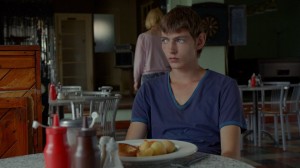 The eye with which Guy Mihill films the world of The Goob is often unstable, gamboling.
The eye with which Guy Mihill films the world of The Goob is often unstable, gamboling.
It does not avail itself of the static rest of the tripod, nor the mechanic fluidity of a steady-cam that encloses everything in geometric pictures to be traversed with rigid precision. Rather, it jolts with every bump of the ground and fumbles laboriously so as not to lose along the way the characters of its narration. We can almost hear it huff and puff, this untamed eye, to keep up with the characters it chooses, so it can pick up their most genuine traits, their deepest essence.
The Goob is a movie of relationships and break-ups. It is a surly and sharp movie which more than the anxiety of an adolescent who is growing up like many others, places at the center of the frame the inevitability of his becoming a man. And it is a movie that places around this character all shadows and little tenderness, a whole series of roads that lead toward the others. Some are one way streets, others are more comfortably wide, others are dead end streets. All are as rough as the countryside roads, just as full of rocks and potholes, so easy to stumble upon.
The Goob is a timeless “sweet sixteen”, with little or no connection to our present and yet firmly rooted in its own. It’s a movie that focuses on things with the wide angle lens of myth in the belief that even a close-up is a landscape full of crags and mountains, with its lights and its silences, scarred by wounds that are not easy to heal.
In his account of the short story of a sixteen year old boy (Goob is his name, played by an excellent Liam Walpole), when he helps out in the family trucker joint, or when he digs in the fields during the pumpkin crop, or when he has to deal with the mother’s boy friend who is so slimy that he steals his girl friends from him, the director never loses sight of the context. The world and the character are on the same plane of signification, you can’t understand one without the other, because the woods, that are never wild, and the fields that must be toiled on every day are exactly like him, the objective correlative of his growing up that no adult wants or can lend help to.
It’s a countryside that is not traversed with a malickian spirit, also because the English director lacks the pantheistic spirit of the american director, but with a glance that always puts man back at the center.
If we really want to embark in a search for comparisons that can be more or less misleading, more than Loach, who devoted for sure memorable pages to the theme of adolescence, a few moments here and there bring to mind the cinema of Shane Meadows. Especially for the ability the director displays when he uses the landscape to amplify an existential malaise that bears some tinges of horror without having its structure or its narrative elements.
The Goob is a raw movie, just like some diamonds ripped from the earth and just as sharp. Raw, above all, as its protagonist, who looks at the world from the oblique trajectory of his solitude and of his unexpressed cry, locked in his chest, too proud even to start to find its way out to the mouth.
It’s a faithful portrait of a region like Fenland, a Cambridgeshire district, and yet lost in its dimension of a borderline between nothing behind and nothing beyond. A place almost never talked about in the English cinema, especially in the oppressive summer heat of an initiation to the adult world which lacks so much cathartic power.
A debut by an author who we hope to hear about again very soon.
(Translated from italian by Maurizio Izzi)
From: Close-up
